The Swedish funded Utariri stewardship programme is officially underway in the middle-lower Zambezi Valley, addressing the climate crisis and threat to biodiversity while boosting livelihoods and fostering stewardship.
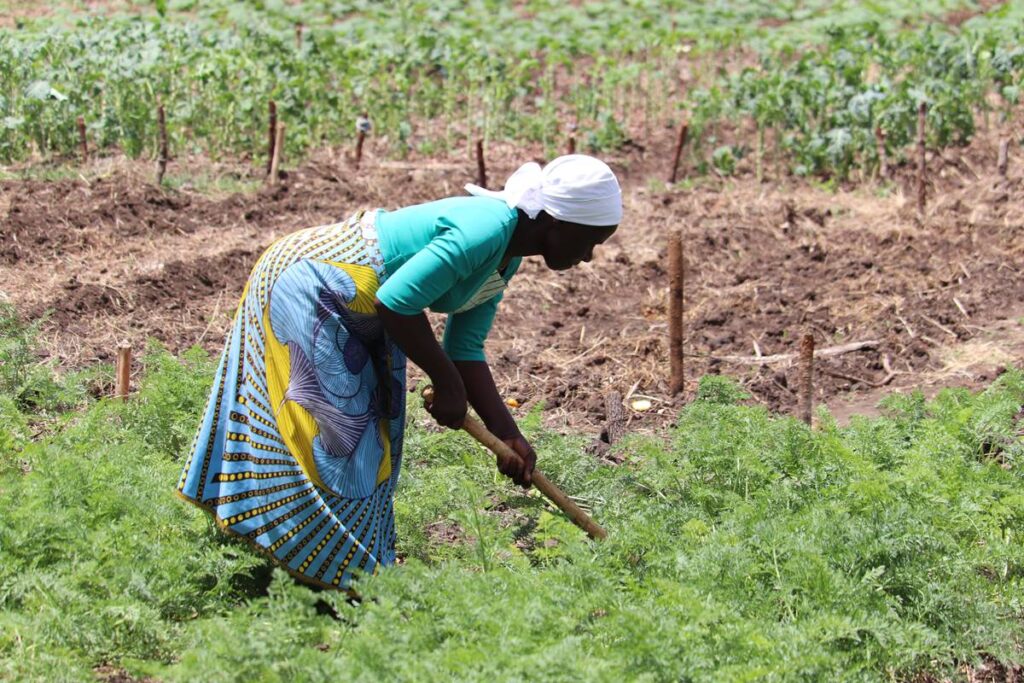
Photo: An women gardens in the Utariri Alpha Village Garden in Nyamakate. By DanChurchAid
Last week, partners, stakeholders and distinguished guests gathered at the Swedish Ambassador’s residence in Harare, to celebrate the launch of Utariri – an integrated biodiversity, climate change and livelihoods project which is currently be rolled out in approximately 27 communities (wards) within and alongside the protected areas in Nyaminyami, Hurungwe, Mbire and Muzarabani districts.
The programme launch was supported and endorsed by guest of honour, Zimbabwe’s Environment and Tourism Patron, her excellency the First Lady of Zimbabwe, as well as Prof. Prosper Matondi, Chief Director of the Ministry of Environment and Tourism and traditional leader Chief Chundu from Chundu community, Hurungwe district, who all delivered speeches at the event. Other speakers included community game scout, Edith John from Mbire, DanChurchAid (DCA) country director Mads Lindegård and Swedish Ambassador Åsa Pehrson.
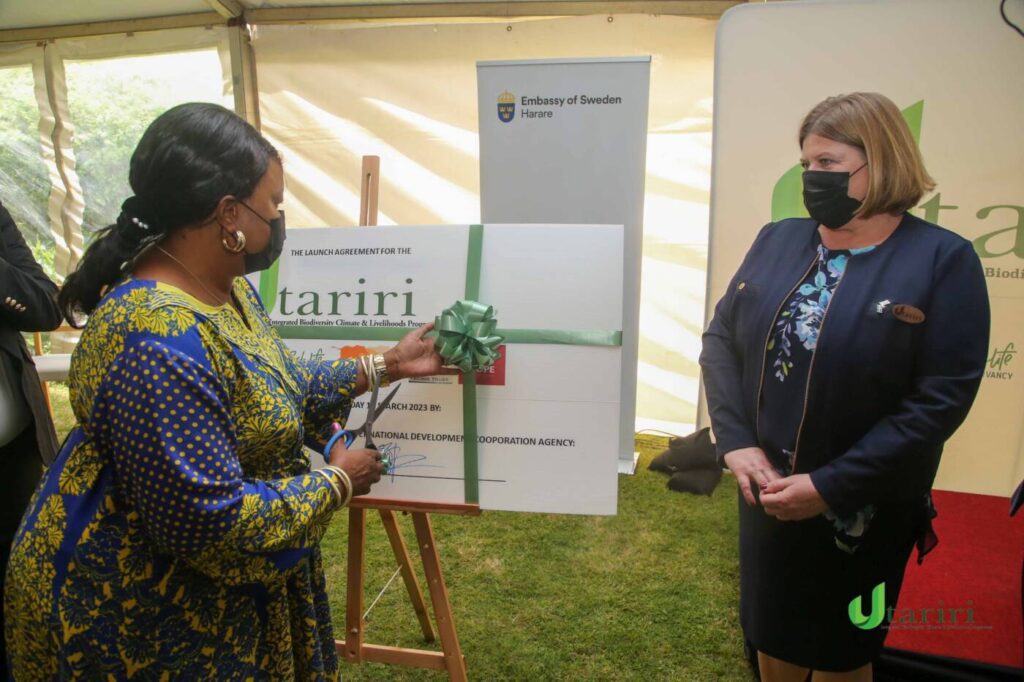
Left: Honorary guest, First Lady of Zimbabwe Dr Auxillia Mnangagwa cuts the ribbon to officiate the launch of Utariri in partnership with Swedish International Development Cooperation Agency (SIDA). Right: Swedish Ambassador, Åsa Pehrson. Photo by DanChurchAid
The three-year long, 5.5-million-dollar project, which is funded by the Swedish International Development Cooperation Agency (SIDA), is the first and largest of its kind for the Zambezi Valley, bringing together expert conservation and development partners together to tackle biodiversity loss and implement new frameworks for environmental management in partnership with local communities. It also aims to accelerate climate adaption and generate sustainable, equal economic opportunities for rural communities.
Guided by the principle of ‘leave no one behind’, the project will create ‘opportunities and choice’ to increase diversified livelihood opportunities and access to food and incomes (DanChurchAid). It is anticipated to reach 12,000 households affected by conservation and biodiversity degradation and 10 conservancies. Among the programme beneficiaries will be conservation entities, protected areas, local communities, smallholder farmers, commodity associations, and private-public sector players, key government agencies including, Forestry Commission, Zimbabwe Parks and Wildlife Management Authority, Rural District Councils, Universities, the Environment Management Agency, and the Communal Areas Management Programme For Indigenous Resources (CAMPFIRE) Association.
The Utariri Consortium is led by DanChurchAid (DCA), and includes conservation organisations Bushlife Conservancy and African Wildlife Foundation, and livelihoods development organisations Farmers Association of Community Self-Help Investment Groups (FACHIG) as well as Future of Hope Foundation. The Zambezi Valley Conservation Network has also been sub-contracted to implement activities in the Utariri programme , and will also provide assistance to the DCA research team.
“The Utariri, Biodiversity, Climate Change and Livelihoods Programme, was established with the aim of accelerating climate adaptation, diversifying livelihoods and income options, improving biodiversity management, and reducing extractive activities through community stewardship in the Zambezi Valley” (www.utariri.org).
The importance of securing partnerships to develop and maintain sustainable, inclusive biodiversity systems, was stressed by Dr Auxillia Mnangagwa at the launch. She stated that one of her goals is to “partner with the most effective partners to reduce ecosystem and species loss, while promoting the welfare of the Zimbabwean people”.
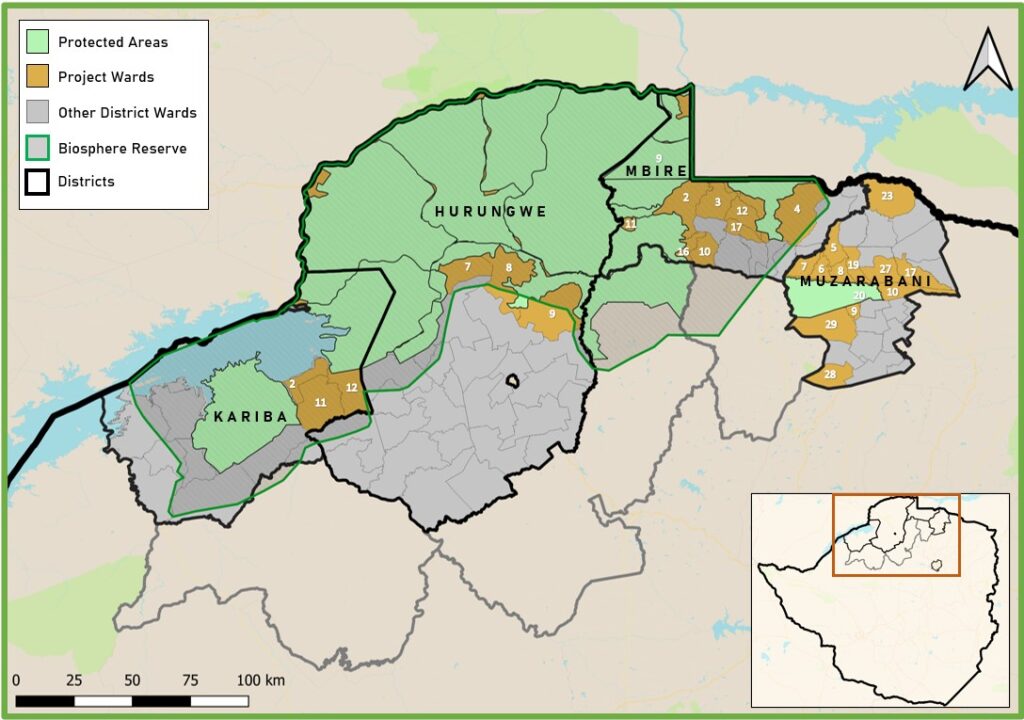
Project Area (by Caton Schutte – ZVCN)
The Utariri (meaning stewardship) consortium is driven to achieve a conservation paradigm which supports equitable joint ownership and the sustainable utilisation of the management of natural resources. The programme recognises the ‘false conflict’ between people and wildlife; a conflict which pits conservation and development against each other and which must be urgently addressed. This conflict is exacerbated by a poor regulatory environment, exclusionary land use and management models, and lack of leadership (Programme Proposal). The Utariri model is one where ecological and community interests are not only aligned, but complementary, where everyone wins – moving away from the lens of ‘people vs planet’ (Utariri newsletter). Within this model, the programme will specifically hone on expanding opportunities for women.
“Traditionally women have played a key yet marginal role in natural resource and biodiversity management. Utariri therefore promotes equitable leadership and ownership roles” (www.utariri.org).
Addressing these core challenges, Utariri endeavours to build partnerships to protect and promote livelihoods, ensuring that poor communities, as well as private and public players, are equal participants and beneficiaries in the management and promotion of biodiversity. One way in which this will be achieved is the through the establishment of new, and strengthening of existing, Community Shared Ownership Trusts (CSOTs) across the project area. In delivering such strategies and projects within the programme, Utariri partners will ensure the ongoing engagement with the communities to understand and harness indigenous traditions and knowledge systems regarding biodiversity management (Programme Proposal).
This integrated biodiversity management and livelihoods approach is currently being explored and tested by DCA and partners in a pilot project which has been rolled out over the past year in the Muzarabani District communal areas. The pilot was funded by the Danish International Development Agency (Danida) and United Nations Development Programme (UNDP) Global Environmental Facility (GEF) under the Zambezi Valley Biodiversity Project. This smaller consortium project is being implemented by My Trees Trust, FACHIG and the Zambezi Valley Conservation Network, under the leadership of DCA.
“Unless the people that are directly impacted by biodiversity loss, climate change or human-wildlife conflict are included in the response to their daily struggles, then none of the efforts will get results,” Mads Lindegard, DCAZimbabwe country director.
The Utariri programme also places focus on addressing the associated challenges and issues which arise at the intersection of ever-expanding human need for space, income and food security, and the preservation of biodiversity and ecosystems. Complex and nuanced issues, such as Human Wildlife Conflict (HWC) and deforestation, requires multi-pronged approaches delivered by specialists, which was another motivation for a consortium set-up, where diverse expertise could be leveraged, holistically. These issues have been further exacerbated by climate change, where droughts are affecting the resilience capacity of ecosystems and species diversity (Utariri newsletter).
Communities living along wildlife corridors are affected by the adverse effects of climate change on food security and household nutrition. Illicit poaching and wildlife encroachment have increased human-wildlife conflict which results in injury and loss of life (www.utariri.org).
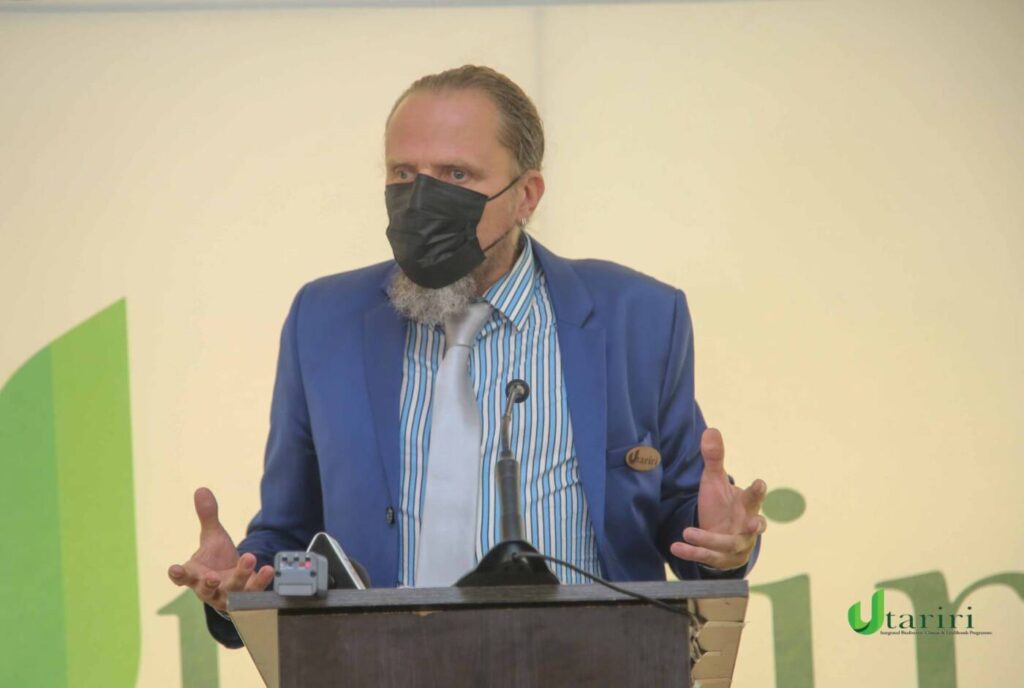
Danish Church Aid Country Director, Mads Lindegard highlighted an alarming statistic, mentioning that, of global population of mammals, only 4% are wild mammals while the remaining 96% comprises livestock and humans, giving a perspective of the immense pressure on our wild spaces and stressing the root of growing challenges such as HWC. He also highlighted how the project area is only a small example and representation of a global crisis, and how Utariri is a test for new approaches to address our global environmental and development challenges. Photo by DanChurchAid
SUMMARY OF UTARIRI KEY PROJECT OUTCOMES
- Increased community stewardship and sustainable utilisation of natural resources focusing on pro-poor and gender sensitive value chains.
- Enhanced ecological restoration and protection of wildlife habitat through broad-based biodiversity actions.
- Enhanced participation of women and youths in resilience building efforts.
- Increased gender sensitive public, private participation in sustainable biodiversity management, climate, and research.
“This integrated model of development is one we strongly support. It is the one thing that has been missing, as we believe that the benefits can only accrue to everyone, if all parties are represented in the response,” says Dr. Berthollet Bwira Kaboru – Swedish Head of Development Cooperation (Utariri Newsletter).
Utariri is already having a significant impact in some communities. Three inspiring stories were shared at the launch event, including a testimonial from Elizabeth Sibanda, a widow from Nyamakate, Ward 7, who has benefitted from the new Alpha Village Garden, which was set up for women in her ward. She said the garden has significantly reduced cases of domestic violence. “Previously most of the women in the community depended on their husbands for money, which caused a lot of strife. But now our husbands are the ones that come to us to ask if we can give them a dollar. The women in our garden are now respectable women with dignity” (www.utariri.org). Watch Elizabeth’s story here.
Another woman who has benefitted from the Alpha garden is Judith Chipangura, who said that her first harvest earned her $700. A mother to five children and grandmother to 16, Judith says it was previously very difficult to provide for the whole family, especially as wild animals would often raid their crops. But since the Urariri programme has stepped in to assist with the garden, and provided a fence, things are much better. Watch Judith’s story here.
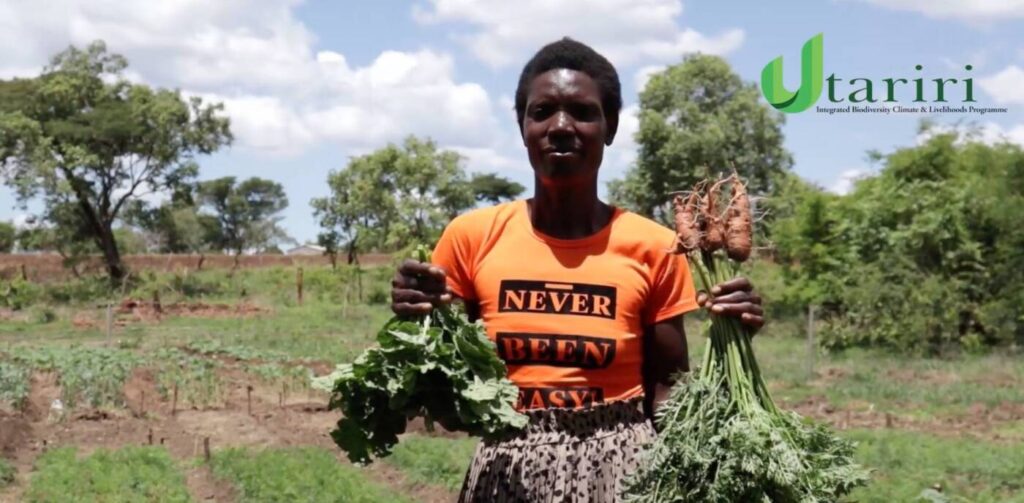
Elizabeth Sibanda is generating income through the Utariri Alpha Village Garden. Photo: www.utariri.org.
Pauline Jali’s story highlights the difficulties of living on the boundaries of the game reserves, which is terrifying for the community. “We have huge challenges managing wildlife, protecting livestock and people,” she shared, giving the example of how lions can raid their livestock, going from kraal to kraal. She said another major issue for the farming community is climate change, whereby they used to plant cotton by mid-October and harvest maize in November. “Now that has all completely changed. By December, no one would have grown anything.” She says the Utariri mushroom project is fantastic because it is not affected by climate change or wild animals, and all it requires is temperature regulation in the hub.
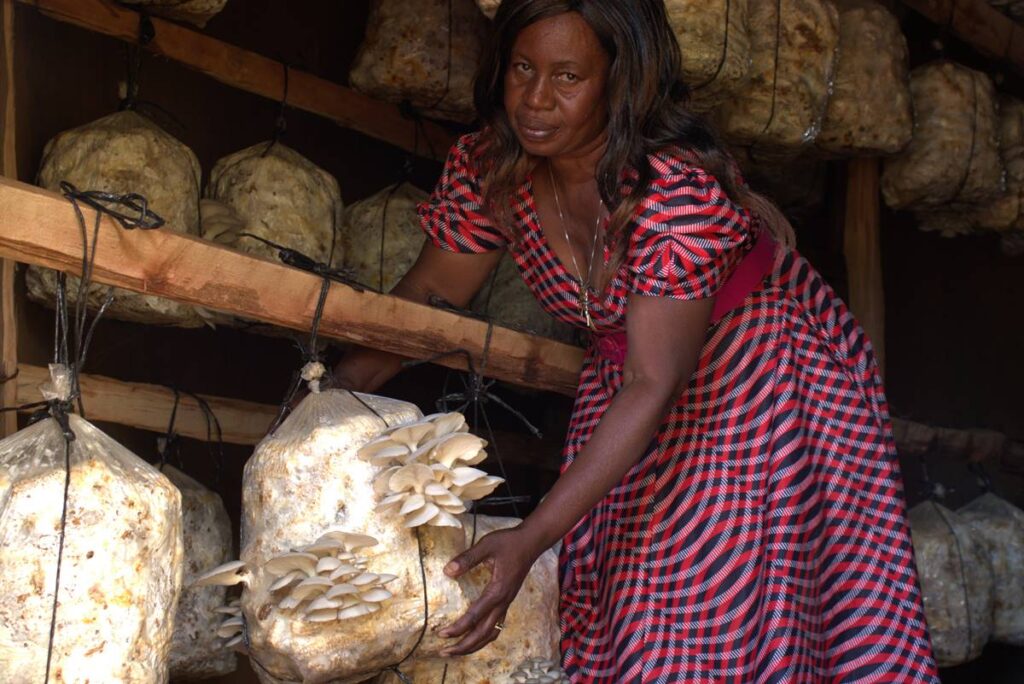
Utariri Mushroom Farming Project Paulina Jali from Sierra Village, Ward 7, Hurungwe District. Photo by DanChurchAid
More about Consortium lead organisation, DanChurchAid
DanChurchAid Zimbabwe draws on a century of global experience implementing development aid programmes, and leading consortia, including the recently concluded five-year, UNDP funded, Sizimele, Zimbabwe Resilience Building Fund (ZRBF) Programme in Matabeleland North and South benefiting over 50,000 people in marginalised communities.
The Utariri stewardship programme, which is the first holistic, landscape-wide integrated biodiversity and livelihood project to be delivered in the Zambezi Valley, has been a long-standing vision of the DanChurchAid, which has been incubating and piloting Utariri for the past three years.
By uniting and harnessing the collective knowledge and expertise of committed conservation and development partners, DCA Zimbabwe has reached its goal of launching an ambitious, pan-landscape programme that will serve both the environment and the people who live there, ensuring that poor communities have equal access to sustainable economic opportunities, while playing a key role in ecosystem protection.
DCA hopes that stakeholders will “see Utariri as an honest attempt to come together, and join the collective fight to restore ecological balance, understanding that a ONE health, ONE life approach means that everyone wins” (Utariri newsletter).
For more information on Utariri contact:
For more information on the Zambezi Valley Conservation Network Projects within the Utariri Programme, please contact
Written by Jaeninne Norris (Zambezi Network Coordinator)

